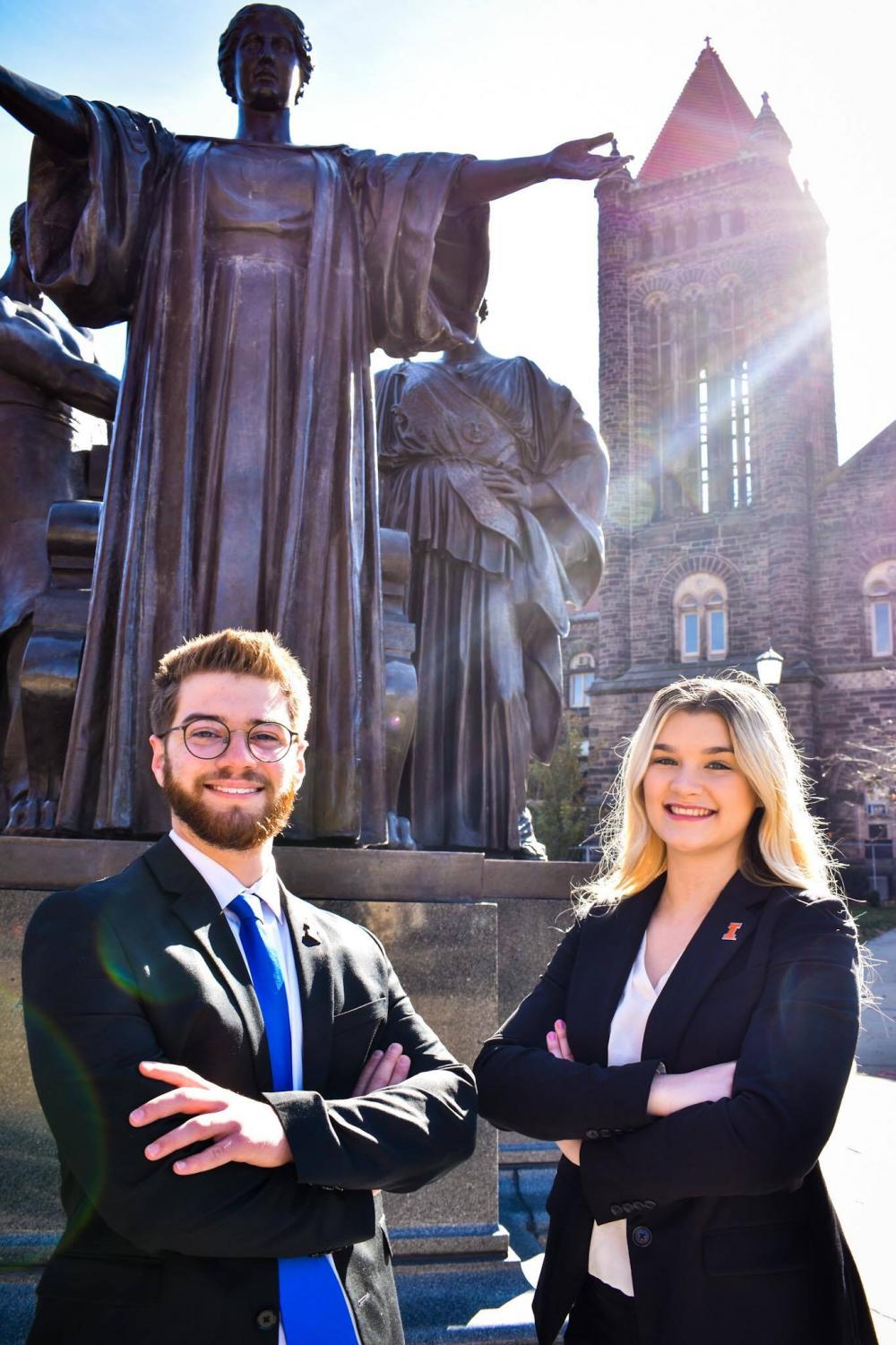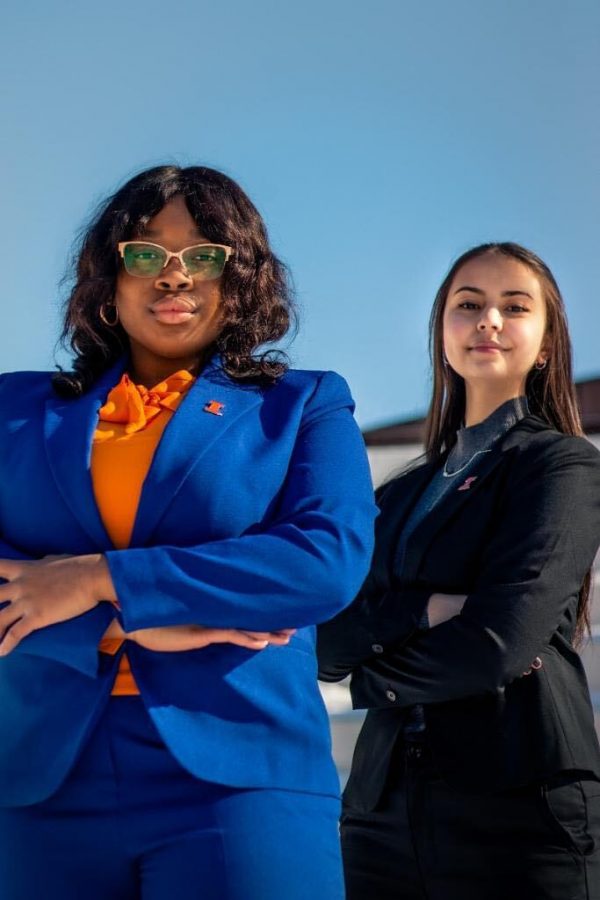ISG’s first COVID-era election begins
Photo Courtesy of the Student Campaigns
Enoma Egiebor and Nicole Arnold pose for a campaign photo.
Mar 11, 2021
Every spring semester, student candidates run for office in campus elections, all the while campaigning to make their platforms known. However, as with many things this year, the pandemic restrictions have made traditional campaigning for campus elections difficult.
Enoma Egiebor and Nicole Arnold, both sophomores in LAS and Illinois Student Government senators, are running for Illinois Student Government student body president and vice president respectively.
Also running for ISG student body president is Tyler Swanson, sophomore in ACES and ISG senator, alongside his running mate Vada Gregory, junior in Media and ISG senator.
In the face of increased mental health issues caused by the pandemic, both campaigns seek to improve the quality of student mental health services.
Swanson and Gregory believe that the pandemic has “revealed a lot of the vulnerabilities” in the University’s mental health system.
Get The Daily Illini in your inbox!

“We have a Counseling Center that, by no fault of its own really, is just not equipped to deal with the problems that students have,” Swanson said. “It’s just that there’s not the money to go around and the Counseling Center isn’t getting that money. That being said, despite that, the Counseling Center is doing a lot of great things.”
Swanson and Gregory plan on raising awareness of existing mental health services and increase ISG lobbying efforts in the state capital to obtain more funding through appropriations for the University’s mental health services.
“That is something that I don’t think a lot of people consider as a being a student government power but it really is, especially when we work with other groups on campus and other organizations that are pursuing similar goals,” Swanson said.
Egiebor and Arnold share these concerns over mental health funding. Egiebor and Arnold also note that the Counseling Center is understaffed and does not have enough counselors from diverse backgrounds.
“I’m a first-generation immigrant, as is Nicole, and sometimes people like us seek mental health help, and sometimes there’s a cultural barrier,” Egiebor said. “They feel they can’t find someone that has their experiences and relates to them.”
Egiebor and Arnold believe that the burden of funding campus mental health services should be taken off of students, noting that the Counseling Center is largely funded through campus fees paid by students.
“A lot of the problems when it comes to the Counseling Center and cultural centers’ funding … is because a lot of those resource centers rely on student fees that are charged every year,” Arnold said. “And with the onset of the pandemic, the University was seeking to cut some of those fees.”
Egiebor and Arnold also want the University to take more action to protect students’ health during flu season, especially with regard to immunocompromised students.
Additionally, both campaigns support the University’s sustainability efforts to reduce the campus’ energy consumption and reliance on fossil fuels.
Swanson notes that the University recently released the Illinois Climate Action Plan for 2020, which aims for the campus to be carbon neutral by 2050. Swanson, who is currently an environmental economics student, believes that this plan can be sped up using ISG’s resources.
“ISG has its own budget that it can use to fund projects,” Swanson said. “We can work with sustainable-minded RSOs to negotiate with the University and to really just talk with them and see where it is that we as students can pursue initiatives to reduce waste and make our campus greener.”
Egiebor and Arnold plan to “apply pressure” on the University administration in order to see to it that the University follows through with its promises regarding sustainability.
“After years of student outcry, the University finally agreed to go fossil-free by 2024,” Egiebor said. “It’s one thing for them to say things than to actually do them. So we’ll apply pressure to the [University] administration. We’ll follow up with them to make sure they’re getting to their goal by the year they say they will.”
Diversity and campus inclusion
Egiebor and Arnold also seek to address the issue of campus diversity and inclusion, saying that marginalized students sometimes “feel demonized” when on campus.
“I feel like a big problem with this University’s administration is they dangle students of color as a bargaining tool,” Egiebor said. “As Nicole said, our cultural centers are underfunded and we don’t have an outlet to be ourselves.”
Egiebor and Arnold plan to engage more with the University’s cultural houses and also create a coalition of student groups that are oriented towards marginalized students and meet with them on a regular basis.
Swanson and Gregory hope to increase student involvement in ISG and promote awareness of what ISG does for students.
“I think a problem that we have with our student government is that a lot of people don’t know what we do,” Swanson said. “And if they do know what we do, they still don’t understand and don’t know what we do for students exactly.”
To do this, they plan to move the four senate-level ISG departments into ISG’s executive branch to better facilitate the involvement of campus RSOs.
“An example would be our Student Wellness Department,” Swanson said. “We want to get Active Minds UIUC; we want to get Illini Fighting Hunger and similar groups involved, so that when we work together, we’ll have a bigger impact. We can pass ISG initiatives onto these clubs. When we speak to the University administration, we know that we’ll have those clubs behind us.”
Swanson and Gregory hope to “make the student experience more accessible to everyone,” noting that not everyone has the money to pay for things like sports tickets and other activities. To remedy this, they plan to negotiate with the University to provide free or discounted tickets for students on the Office of Financial Aid’s Illinois Commitment or Illinois Promise programs.
Swanson and Gregory also plan on increasing the involvement of Greek life in ISG in order to better represent the interests of fraternities and sororities.
“There are times when the University takes action against these fraternities and sororities, and they feel like they need someone to tell their side of the story,” Swanson said. “We’re committed to being a voice for everyone, and that includes every student.”
Voting for this year’s campus elections will take place on Tuesday, March 23 and Wednesday, March 24.






